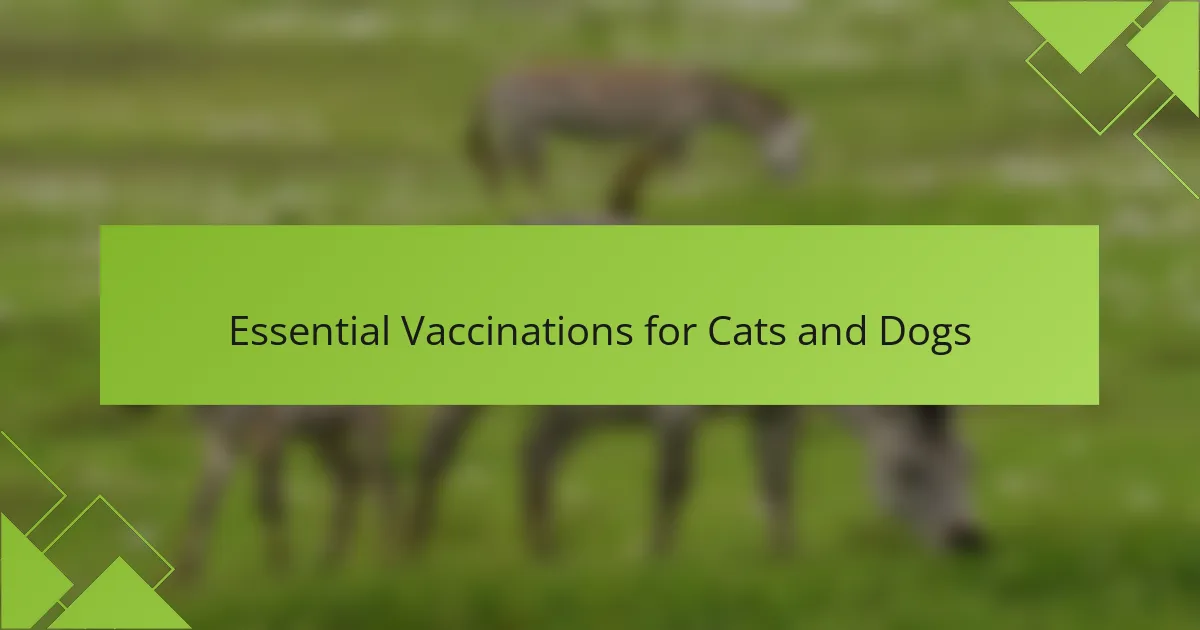Vaccinations are vital for the health of cats and dogs, protecting them from serious diseases like rabies and parvovirus. Core and non-core vaccinations are essential for maintaining immunity and preventing outbreaks. Understanding vaccination schedules and regional regulations helps pet owners make informed decisions. Consulting a veterinarian ensures tailored vaccination plans for individual pets based on their age and lifestyle.

Why are vaccinations essential for cats and dogs?
Vaccinations are essential for cats and dogs because they protect against serious diseases. Vaccines stimulate the immune system, preventing infections such as rabies, distemper, and parvovirus. Regular vaccinations can lead to a healthier lifespan for pets and reduce the spread of contagious diseases. Vaccination schedules vary; consult a veterinarian for tailored advice.
What diseases do vaccinations protect against?
Vaccinations protect cats and dogs against various diseases, including rabies, distemper, parvovirus, and feline leukemia. These essential vaccinations significantly reduce the risk of severe illnesses and promote overall health. For example, rabies vaccination is crucial due to its fatal nature and transmission to humans. Distemper and parvovirus vaccinations are vital for preventing highly contagious and often deadly diseases. Feline leukemia vaccination is important for protecting cats from a virus that can lead to cancer and immune system issues. Regular vaccination schedules ensure pets remain protected throughout their lives.
How do vaccinations contribute to public health?
Vaccinations significantly enhance public health by preventing disease spread among pets. Essential vaccinations for cats and dogs protect against serious illnesses like rabies, distemper, and parvovirus. These vaccines reduce the risk of outbreaks, benefiting both animal and human populations. Regular vaccination schedules contribute to herd immunity, lowering the incidence of preventable diseases. Additionally, vaccinated pets often require fewer medical interventions, leading to reduced healthcare costs for owners and communities.
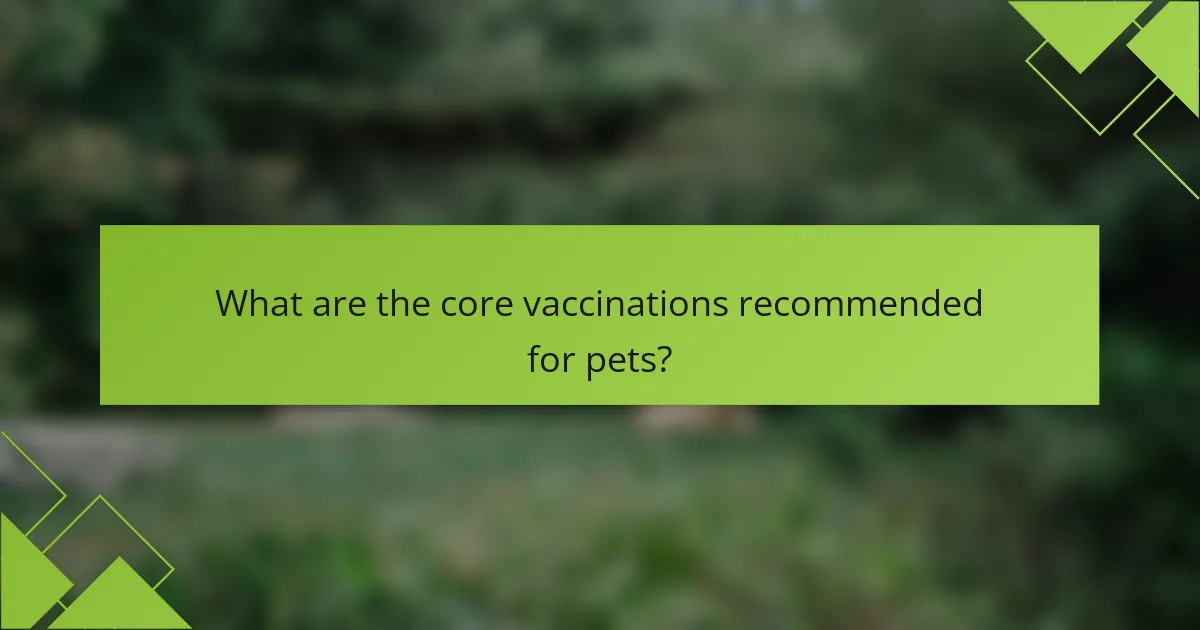
What are the core vaccinations recommended for pets?
Core vaccinations recommended for pets include rabies, distemper, parvovirus, and adenovirus for dogs, while cats should receive vaccinations for feline panleukopenia, feline calicivirus, feline herpesvirus, and rabies. These vaccines protect against serious diseases and are essential for pet health. Regular vaccination schedules help maintain immunity and prevent outbreaks. Consult a veterinarian for specific recommendations based on pet age, health status, and lifestyle.
Which vaccinations are mandatory for cats and dogs?
Cats and dogs require several mandatory vaccinations to ensure their health and safety. Core vaccines for dogs include rabies, distemper, parvovirus, and adenovirus. For cats, essential vaccinations are rabies, feline viral rhinotracheitis, calicivirus, and panleukopenia. These vaccinations protect against serious diseases and are often legally required. Regular booster shots are also necessary to maintain immunity.
How do core vaccinations vary by region?
Core vaccinations for cats and dogs vary by region due to differences in disease prevalence and regulations. In North America, essential vaccines include rabies, distemper, and parvovirus for dogs, while cats typically receive rabies, feline viral rhinotracheitis, and calicivirus. In Europe, the vaccination schedule may include additional vaccines like leptospirosis for dogs, reflecting regional health concerns. In tropical regions, vaccines against diseases like leptospirosis and canine influenza are more common due to higher exposure risks. Local veterinary guidelines often dictate the specific vaccines recommended based on regional disease outbreaks and environmental factors.

What are the differences between core and non-core vaccinations?
Core vaccinations are essential for protecting pets against serious diseases, while non-core vaccinations are optional and based on specific risk factors. Core vaccinations for dogs include rabies, distemper, and parvovirus. For cats, core vaccines typically consist of rabies, feline distemper, and calicivirus. Non-core vaccines may include those for kennel cough in dogs or feline leukemia in cats, depending on lifestyle and exposure risks. Understanding these differences helps pet owners make informed vaccination choices tailored to their pets’ needs.
Which non-core vaccinations should pet owners consider?
Pet owners should consider non-core vaccinations based on their pet’s lifestyle and risk factors. These vaccinations may include Bordetella, Lyme disease, and Leptospirosis. Bordetella protects against kennel cough, particularly for pets in social settings. Lyme disease vaccination is advisable for pets in tick-prone areas. Leptospirosis is important for pets exposed to contaminated water or wildlife. Consulting with a veterinarian can help determine the best options for individual pets.
How do lifestyle and environment influence vaccination choices?
Lifestyle and environment significantly influence vaccination choices for cats and dogs. Factors such as living conditions, exposure to diseases, and owner awareness shape vaccination decisions.
Urban pets may face different health risks compared to rural pets, prompting tailored vaccination schedules. For instance, a dog living in a city may require vaccines for leptospirosis due to higher exposure rates.
Pet owners’ lifestyle choices, including travel frequency and participation in dog parks, also impact vaccination needs. Increased interaction with other animals raises the likelihood of disease transmission, necessitating comprehensive vaccination.
Moreover, some owners may prioritize vaccinations based on perceived risks from their environment, leading to variations in vaccination adherence. Understanding these influences can help veterinarians recommend appropriate vaccination strategies.

When should pets receive their vaccinations?
Pets should receive their vaccinations according to a schedule based on their age and health status. Puppies and kittens typically start their vaccinations at six to eight weeks of age.
Core vaccinations for dogs include rabies, distemper, and parvovirus, while cats should receive rabies, feline distemper, and feline leukemia. Annual boosters are usually recommended to maintain immunity.
Consult your veterinarian for specific vaccination timelines and any additional vaccines based on your pet’s lifestyle and risk factors. Regular vaccinations help prevent serious diseases and maintain overall health in pets.
What is the vaccination schedule for puppies and kittens?
Puppies and kittens require vaccinations starting at six to eight weeks of age. Essential vaccinations include distemper, parvovirus, and rabies for puppies, and feline viral rhinotracheitis, calicivirus, and rabies for kittens.
Puppies typically receive their first vaccination at six to eight weeks, followed by boosters every three to four weeks until they are 16 weeks old. Kittens begin their vaccinations at the same age, with similar booster schedules.
Regular veterinary check-ups are crucial to ensure timely vaccinations and overall health monitoring. Following the vaccination schedule helps protect pets from serious diseases and contributes to public health by preventing the spread of zoonotic diseases.
How often do adult pets need booster shots?
Adult pets typically need booster shots every 1 to 3 years, depending on the vaccine type and local regulations. Core vaccines for dogs include rabies, distemper, and parvovirus, while cats require rabies and feline viral rhinotracheitis. Regular booster shots maintain immunity and protect against diseases. Consult your veterinarian for tailored vaccination schedules based on your pet’s health and lifestyle.

What are the potential side effects of vaccinations?
Vaccinations can cause mild to moderate side effects in pets, including lethargy, swelling at the injection site, and mild fever. Severe reactions are rare but can include allergic responses and anaphylaxis. Monitoring pets post-vaccination is crucial.
How can pet owners recognize adverse reactions?
Pet owners can recognize adverse reactions by monitoring their pets for unusual behaviors or symptoms after vaccination. Common signs include lethargy, swelling at the injection site, vomiting, or difficulty breathing. Immediate veterinary consultation is essential if severe reactions occur. Timely recognition can help ensure the pet receives appropriate care.
What should be done if a pet has a reaction to a vaccine?
If a pet has a reaction to a vaccine, seek veterinary assistance immediately. Monitor the pet for symptoms like swelling, lethargy, or difficulty breathing. Provide details about the vaccine and the timing of the reaction to the veterinarian. Mild reactions may be manageable at home, but severe cases require urgent care. Vaccination reactions can vary but are typically rare, highlighting the importance of professional guidance.
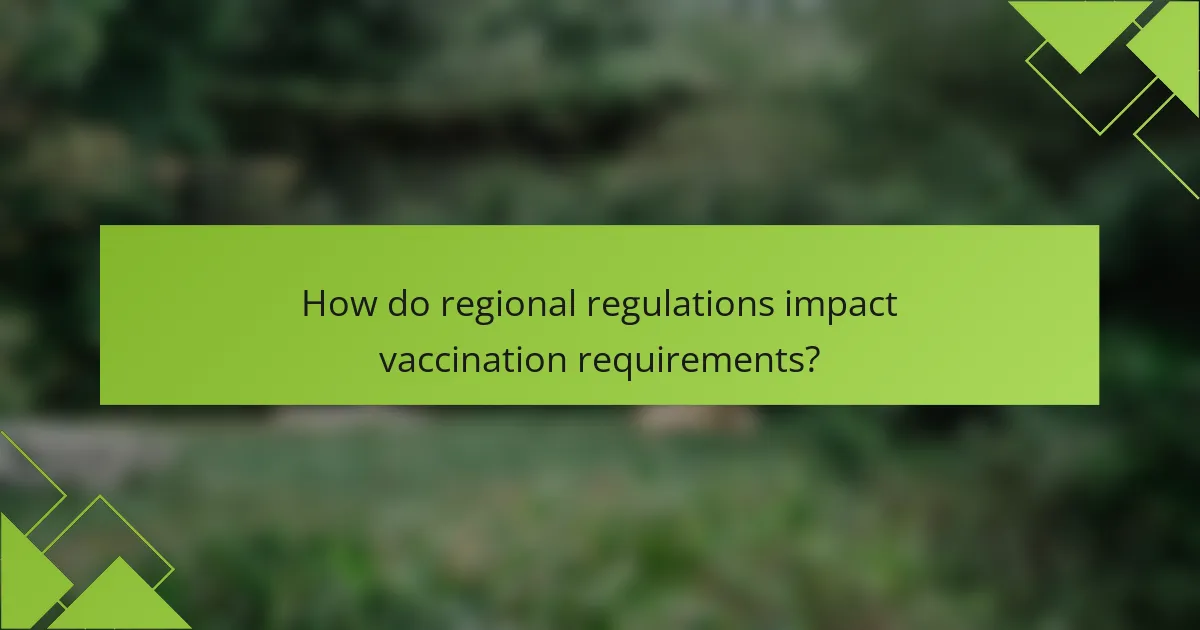
How do regional regulations impact vaccination requirements?
Regional regulations significantly influence vaccination requirements for cats and dogs. Variations in state or local laws can dictate which vaccinations are mandatory, affecting pet owners’ responsibilities. For instance, some regions require rabies vaccinations for dogs, while others may have specific guidelines for feline vaccinations. Compliance with these regulations ensures public health and prevents disease outbreaks. Additionally, unique attributes such as exemption clauses for certain health conditions may exist in specific jurisdictions, highlighting the importance of understanding local laws. Pet owners should consult local veterinary guidelines to stay informed about vaccination mandates.
Which organizations set vaccination guidelines for pets?
The organizations that set vaccination guidelines for pets include the American Veterinary Medical Association (AVMA), the American Animal Hospital Association (AAHA), and the World Small Animal Veterinary Association (WSAVA). These entities provide evidence-based recommendations to ensure the health and safety of pets through vaccination protocols. The AVMA focuses on overall veterinary practices, while the AAHA emphasizes standards for companion animal hospitals. The WSAVA offers global perspectives on pet health, including vaccination strategies.
How can pet owners stay informed about local vaccination laws?
Pet owners can stay informed about local vaccination laws by regularly checking government websites and local veterinary offices. Engaging with community groups on social media also provides updates and resources. Additionally, subscribing to newsletters from animal welfare organizations can offer timely information on vaccination requirements.
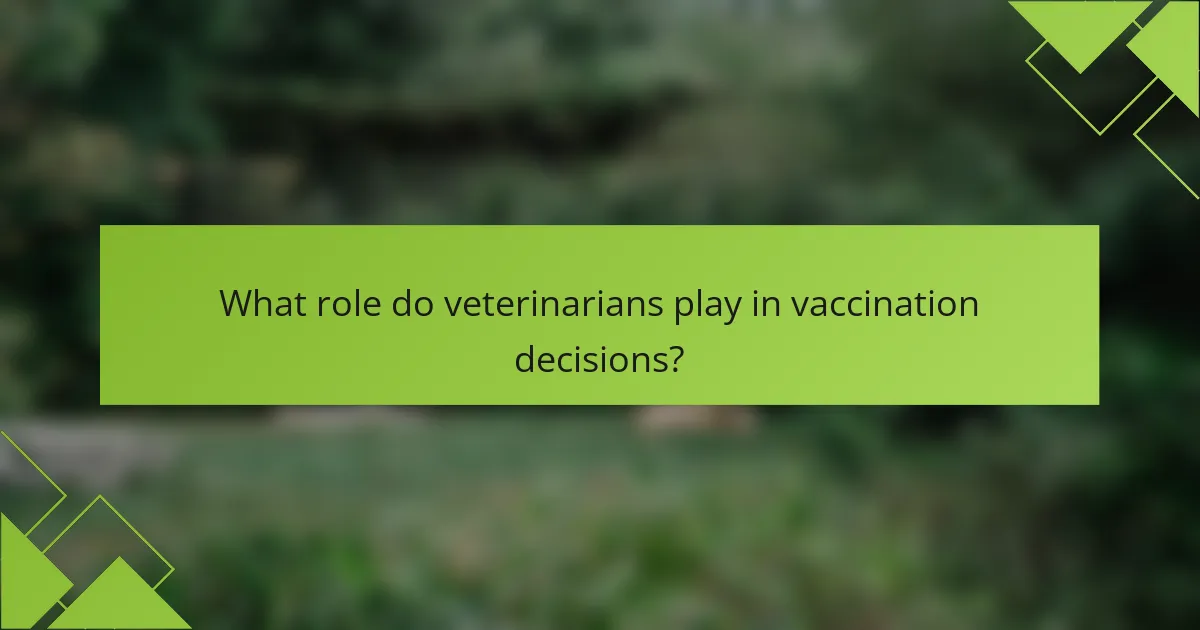
What role do veterinarians play in vaccination decisions?
Veterinarians play a crucial role in vaccination decisions for pets. They assess individual health needs, recommend appropriate vaccines, and schedule immunizations based on age and lifestyle. Their expertise ensures pets receive essential vaccinations, such as rabies and distemper, to protect against serious diseases. Regular consultations with veterinarians help owners stay informed about vaccine updates and emerging health threats.
How can pet owners choose the right veterinarian for vaccination advice?
Pet owners should consider several factors when choosing a veterinarian for vaccination advice. Look for a veterinarian with experience in preventive care and a solid understanding of essential vaccinations for cats and dogs. Check their credentials, including board certifications and memberships in professional organizations.
Evaluate their communication style; a good veterinarian should explain vaccination schedules and potential side effects clearly. Consider their clinic’s reputation by reading reviews and asking for recommendations from other pet owners. Finally, assess the clinic’s facilities and staff to ensure they provide a comfortable environment for pets.
What questions should pet owners ask their vet about vaccinations?
Pet owners should ask their vet about vaccination schedules, potential side effects, and the necessity of specific vaccines. They should inquire about the core vaccines required for their pets’ health and any additional vaccines based on lifestyle or geographic location. Understanding the duration of immunity provided by vaccines is crucial. Additionally, ask about any recent changes in vaccination guidelines or recommendations.
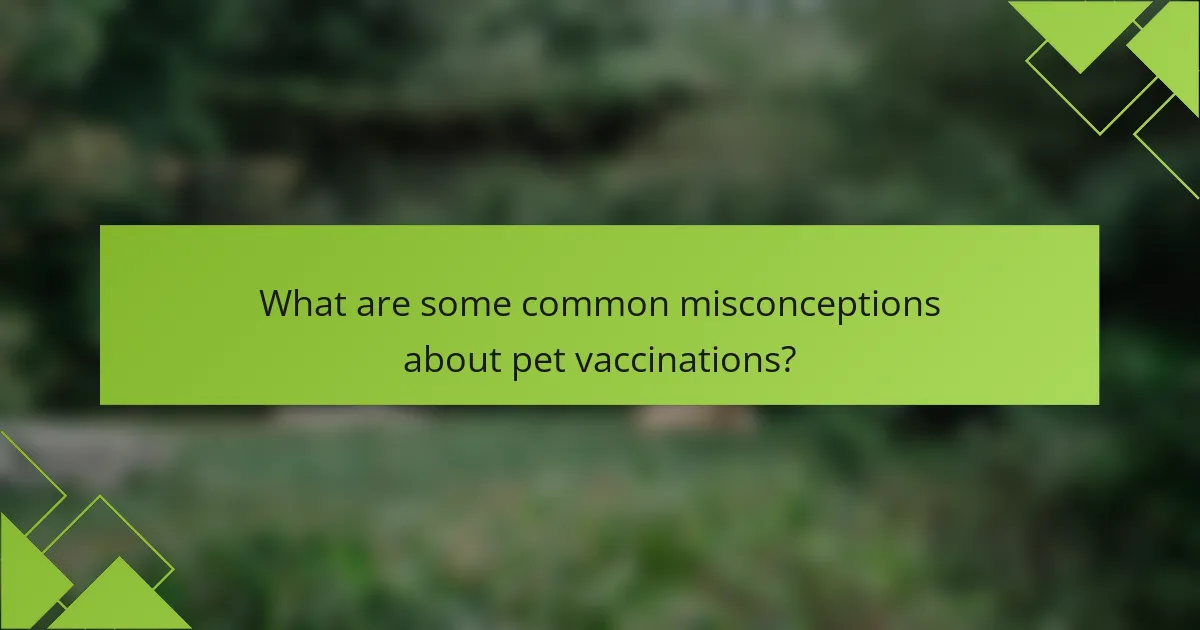
What are some common misconceptions about pet vaccinations?
Many people mistakenly believe that pet vaccinations are unnecessary or harmful. Vaccinations are crucial for preventing serious diseases in cats and dogs. A common misconception is that indoor pets do not need vaccinations; however, they can still be exposed to diseases through various means. Some owners think that all vaccines are given annually, but many have extended intervals. Additionally, there is a belief that vaccines can cause long-term health issues, while studies show that the benefits far outweigh the risks. Understanding these misconceptions can help ensure pets receive appropriate care and protection.
How can misinformation affect pet health decisions?
Misinformation can lead to poor health decisions for pets, risking their well-being. Many pet owners might neglect essential vaccinations due to false claims about their safety or necessity. For instance, some may believe that indoor cats do not require vaccinations, which can expose them to preventable diseases.
Vaccinations are crucial for preventing serious illnesses in both cats and dogs. The American Veterinary Medical Association states that core vaccines protect against diseases like rabies and distemper. Misinformation can create hesitancy, resulting in lower vaccination rates and increased health risks.
Inaccurate information may also mislead owners about vaccination schedules. Some may think that vaccinations are optional or can be delayed without consequences. This misunderstanding can lead to gaps in immunity, making pets more vulnerable to infections.
Ultimately, ensuring accurate information about vaccinations is vital for the health of pets. Pet owners should consult veterinarians to verify vaccination needs and avoid the pitfalls of misinformation.
What resources are available for accurate vaccination information?
Reliable resources for accurate vaccination information for cats and dogs include veterinary associations, government health departments, and reputable animal welfare organizations. Websites like the American Veterinary Medical Association and the Centers for Disease Control and Prevention provide updated guidelines and research. Additionally, consulting a licensed veterinarian ensures personalized advice based on specific pet needs. Access to these resources fosters informed decisions regarding essential vaccinations, which are critical for pet health and community safety.
What are best practices for ensuring pet vaccination compliance?
To ensure pet vaccination compliance, establish a clear communication plan with pet owners. Regular reminders and educational materials about the importance of vaccinations can significantly enhance compliance rates.
Create a vaccination schedule that aligns with veterinary guidelines, ensuring owners are aware of due dates. Offer incentives, such as discounts on services, to encourage timely vaccinations.
Utilize technology, like appointment reminders via text or apps, to keep pet owners informed. Monitor vaccination records diligently to identify pets that are overdue and follow up proactively.
Engagement through community outreach programs can also raise awareness and foster a culture of compliance among pet owners.
